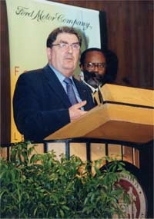John Hume, a 1998 recipient of the Nobel Peace Prize, spoke on "The Philosophy of Conflict Resolution" as the third Ford/MIT Nobel laureate lecturer on Oct. 15.
Hume, a member of British and of European parliaments, was co-winner of the Nobel in recognition of his efforts to end violence in Northern Ireland. He was the "clearest and most consistent of Northern Ireland's political leaders in his work for a peaceful solution to the 30-year conflict," the Nobel committee said. Hume shared the prize with David Trimble, also a Northern Ireland member of Parliament and leader of the Ulster Unionist Party.
A former teacher, Hume, 64, is widely associated with laying the foundation for the 1998 Good Friday Agreement--a pioneering document that structured peaceful resolution of once-intractable conflicts between Ireland and Great Britain, Ireland and Northen Ireland and within Northern Ireland.
"The Troubles," as the three decades of violence in Northern Ireland are known, have cost the life of one out of 450 people, according to Hume--equivalent to half a million people in the United States--and 40,000 were maimed or injured (the equivalent of 5 million here).
Hume's lecture combined stirring language with a tone of patience. He repeated words he had said many times to friends and foes, and even expressed a rueful gallows humor about himself and his message: "What's 30 years? A little time. At home they call it 'Hume-speak.'"
"Let us have our dream and work for that dream. Our common humanity transcends our differences. Difference is an accident of birth. Problems can't be solved without everyone coming to the same table. There is no peace without dialogue," he said.
"When people are divided as we were in Ireland, they cannot be brought together by guns and bombs. That only deepens the divisions. The history of conflict resolution in Europe is based on three principles: respect for difference, creation of institutions that respect difference, and a healing process based on working together for our common interests. The essense of unity is respect for diversity," he said.
In answering questions about whether his principles might also apply to the conflicts in the Middle East and between Al Qaeda and the United States, he drew from his experience in Ireland and Europe in listing peaceful dialogue, inclusive partnership and economic opportunity as essential.
He focused on "real politics"--housing, education and jobs--as necessary to building viable communities. He also reminded the audience that Americans already possess the first principle of conflict resolution. "It's in your pocket, if you have a coin. 'E pluribus unum'--out of many, one--is the way," he said.
"The era of the city-state has ended. We're living in a post-nationalist world of interdependent people. Human beings are the only wealth we really have. Keep developing your talents as fully as possible. The time for a peaceful world has arrived," he said.
Hume first came to prominence through the civil rights movement in Ireland in the late 1960s. Inspired by the example of Martin Luther King Jr., he advocated nonviolence as Catholics demanded an end to discrimination in employment, housing and political participation in Northern Ireland.
He went on to found the the moderate nationalist Social Democratic and Labour Party in 1970, become a member of the European Parliament in 1979 and, in the late 1980s, began applying the principles of conflict resolution to the hostilities among British, unionist and Irish Republican Army forces.
A version of this article appeared in MIT Tech Talk on October 17, 2001.






